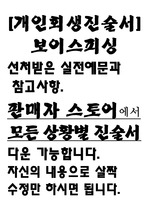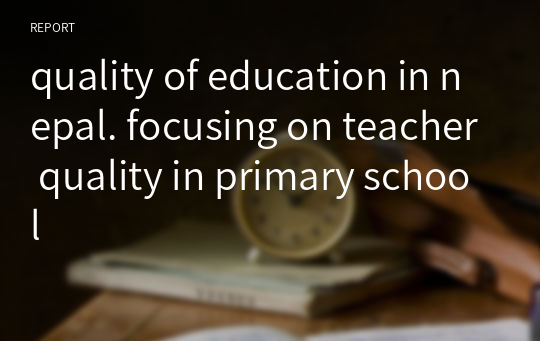quality of education in nepal. focusing on teacher quality in primary school
개발협력
다운로드
장바구니
소개글
"quality of education in nepal. focusing on teacher quality in primary school"에 대한 내용입니다.목차
1. Introduction2. Quality issues in primary school in Nepal
1) What is quality of education and how it is measured?
2) Why teacher quality is important?
3) Current status of Quality in primary education and teacher quality in Nepal
3. Conceptual framework for teacher quality
4. Assessment of teacher quality through the lens of Quality Framework
5. Inputs: qualifications
1) Lack of trained teachers affecting the quality of education
6. Process: management and practice in classroom
1) Problems with teaching methods in the Nepalese public schools
2) Poor teacher management systems in primary schools
7. Outcome: teacher effectiveness and student outcome
1) The relationship between teacher effectiveness and student achievement in primary schools
8. Conclusion
본문내용
Nepal has experienced remarkable paradigm shifts of education over the last several years. ‘Access to education’ which is one of the most important national agendas was formed between the 1950s and 1990s and it has been changed from ‘access to education’ to ‘quality of education’ since 1990 (Koirala et al, 2013).Before the 1950s, education was only for the privileged classes thereby it was limited for other people. In 1971, the Nepalese government introduced a new education system plan that increased school enrolment and access to basic education (Bhatta, 2008). However, during the expansion of the school enrolment and access to primary education agenda, the Nepalese government policy considered an increase in the number of schools. As a result, there were untrained and unqualified teachers including those teaching in primary schools (Government of Nepal, 2009). Hence, ‘the quality of education’ agenda has taken place since the 1990s (Koirala et al, 2013).
참고 자료
An, X and Hannum, E and Sargent, T. (2008). Teaching Quality and Student Outcomes: Academic Achievement and Educational Engagement in Rural Northwest China, An International Journal, Vol.5, No.2 , p.309-334, ChinaArcharya, U. D. (2002). Primary Education in Nepal: policy, problems, and prospects, Ekta, Kathmandu
Asian Development Bank (ADB). (2012). Nepal: teacher education project, Validation Report
Bennell, P. (2004). Teacher motivation and incentives in sub-Saharan Africa and Asia, UK, [Online], Available at: http://eldis.org/fulltext/dfidtea.pdf
Bhatta, S. D. (2008). Tackling the problems of quality and disparity in Nepal’s school education: The OLPC model, Studies in Nepali History and Society, 13(1), p.17- 48
Bista, M. B. (2006). Status female teachers in Nepal, UNESCO, Kathmandu, Nepal
Brown, M and Ajmal, Y. (2011). Leading Learning: A report on effective school leadership, VSO, London
CERID. (2002a). Journal of Early Childhood Development, vol. 5, Tribhvan University, Research Centre for Educational Innovation and Development (CERID), ECD Resource Centre, Balkhu, Kathmandu, Nepal
CERID. (2002b). School Effectiveness in Nepal: A Synthesis of Indicators, CERID, Kathmandu, Nepal
CERID. (2003). Effective Classroom Teaching/Learning Phase II: Transfer of Training Skills in the Classroom Delivery, CERID, Kathmandu, Nepal
CERID. (2004). Effective Classroom Teaching Learning Phase III: School Based Assessment, Kathmandu, Nepal
Department of Education. (2006). A study on Effectiveness of Primary Teacher
Training in Nepal: final report, Government of Nepal, Kathmandu, Nepal
Dilshad, R. M. (2010). Assessing quality of teacher education: a student perspective, Pakistan Journal of Social Science (PJSS), Vol.30, No. 1, p. 85-97
Dolan, J., Golden, A., Ndaruhutse, S and Winthrop, R. (2012). Building effective teacher salary systems in fragile and conflict-affected states, the Centre for Universal Education at Brookings and CfBT Education Trust, USA and UK
Gautam, K. C. (2008). Quality Basic Education as the Foundation for Nepal's Development, Kathmandu University, Kathmandu,
[Online], Available at: http://files.eric.ed.gov/fulltext/ED491196.pdf
Goe, L. (2007). The link between teacher quality and student outcomes: a research synthesis, National Comprehensive Centre for Teacher Quality, USA
Government of Nepal. (2009). School Sector Reform Plan 2009-2015: Vulnerable community development framework (VCDF), Ministry of Education, Kathmandu, Nepal
Hanushek, E. A and Rivkin, S. G. (2006). Teacher quality, [Online], Available at: http://hanushek.stanford.edu/sites/default/files/publications/Hanushek%2BRivkin%202006% 20HbEEdu%202.pdf
Heck, R. H. (2009). Teacher effectiveness and student achievement: Investigating a multilevel cross-classified model, Journal of Educational Administration, Vol. 47, No. 2, p. 227-249, USA
Karki, Y. B and Vashisth, K. (2014). Child-centred teaching: Facilitator’s perceptions and practices in Nepalese Early Childhood Development (ECD) centre, Chitkara University, Vol. 2, No.1, p.93-98, India
Kelly, S. (2012). Assessing teacher quality: understanding teacher effect on instruction and achievement, Teachers College Press, New York
Koirala, B. N and Bharati, S. (2013). The Effectiveness of the Teacher Training Quality Education Program: An evaluation report, Rural Education and Environment Department Centre (REED), Kathmandu, Nepal
Lohani, S, Singh, R.B and Lohani, J. (2010). Universal primary education in Nepal: fulfilling the right to education, UNESCO IBE
Maria, M. T and Jari, M. (2013). Comparison of Nepalese and Finnish Teachers´ Perceptions of Good Teaching , Asian journal of Humanities and Social Sciences (AJHSS), Vol.1, No. 2, NASA Unit, Educational Review Office and Ministry of Education, Kathmandu, Nepal
Mcber, H. (2000). Research into Teacher Effectiveness: A Model of Teacher Effectiveness, DFEE, Norwich, UK
McCaffrey, D. F, Sass, T. R and Lockwood, J. R. (2008). The intertemporal stability of teacher effect estimates, [Online],
Available at: http://www.wcer.wisc.edu/news/events/vam%20conference%20final%20papers/intertempora
lstability_mccaffreysasslockwood.pdf
Ministry of Education. (2003). Education for All National Action Plan, Nepal National Commission for UNESCO, Kathmandu
Ministry of Education. (2009). School Sector Reform Plan 2009-2015. Government of Nepal, Kathmandu
Ministry of Education. (2011). School Level Educational Statistics of Nepal Consolidated Report 2010, Government of Nepal, Kathmandu
Ministry of Education. (2013). School Sector Reform Plan Status Report 2011, Kathmandu, Nepal.
Ministry of Education and Sports. (2004). The development of education: national report of Nepal, Kathmandu
Ministry of Education and Sports. (2008). Primary education curriculum, Government of Nepal, Kathmandu
Monazza, A. (2003). Determinants of student achievement in government and private schools in Pakistan, Pakistan Development Review, Vol. 42, No.4, p.841–876
NAAC. (2007). Quality indicators for teacher education, National Assessment and Accreditation Council (NAAC), National Printing Press, India
NCED. (2013). Terms of Reference (TOR) for the study Effectiveness of Teacher Professional Development (TPD) Program in Nepal, NCED, Nepal
Ngware, M. W and Oketch, M and Ezeh, A.C. (2010). Quality of primary education inputs in urban schools: evidence from Nairobi, education and urban society, p. 1-26. SAGE, [Online], Available at: http://eus.sagepub.com/content/43/1/91
Ngware, M. W and Oketch, M and Ezeh, A.C. (2011). Quality of primary education inputs in urban schools: evidence from Nairobi, education and urban society, 43(1), p.91-116, SAGE
Nishimuko, M. (2007). Problems behind Education for All (EFA): The case of Sierra Leone, Eudcation research paper, Vol.7, No.2, p.19-29
Norad. (2009). Joint Evaluation of Nepal’s Education for All 2004-2009 Sector Programme, Norwegian Agency for Development Cooperation, Oslo, Norway
Parajuli, D. R and Das, T. (2013). Performance of community schools in Nepal: A micro level analysis, International journal of scientific &technology research, Vol.2, No.7
Peters, S. J. (2007). An Input-Process-Outcome Framework for Inclusive Education in the South, Paper prepared for Presentation at the CASP-DISES South American Special Education Forum, Lima, Peru
Pokharel, A. K and Paudel, J. (2013). Cultural factors causing differences in quality education, Tribhuvan University, Nepal
Pradhan, L. (2011). Teacher education in Nepal, Journal of Educational and Social Research, Vol.1, No.5, Nepal
Ravens, J. V. (2009). Early Childhood Development in Nepal: Expansion, Inclusion, Quality, A study to support the further development of Nepal’s national policy for early childhood, the Department of Education of Nepal and the National Office of UNICEF in Kathmandu, Nepal
Sanjjad, S. (2009). Effective teaching methods at higher education level, University of Karachi, Pakistan
Santwona Memorial Academy Educational Research Centre (SMAERC). (2008). A comparative study of school cost between community and institutional schools, final report, MOE, Nepal
Sherestha, P. (2005). Lessons from the classroom: A policy research report on teacher’s motivation and perceptions in Nepal, VSO, UK, [Online], Available at: http://www.vsointernational.org/Images/lessons-from-classrooom-nepal_tcm76-22698.pdf
Sommers, M. (2005). Islands of education: schooling, civil war and the southern Sudanese (1983–2004), IIEP-UNESECO, Paris
Stephens, D. (2006). The quality of primary education in developing countries: who defines and who decides? [Online], Available at: http://dx.doi.org/10.1080/0305006910270208
Strong, M. (2011). The Highly Qualified Teacher: What Is Teacher Quality and How Do We Measure It?, [Online], Available at: http://store.tcpress.com/0807752258.shtml
Thapa. A. (2011). Does private school competition improve public school performance? The case of Nepal (unpublished doctoral dissertation), Columbia University, New York
The Department of Education. (2012a). A study on the status of teacher management in community school in Nepal, Nepal, [Online], Available at:
http://www.doe.gov.np/files/Files/A%20STUDY%20ON%20TEACHER%20MANAGEMENT%20OF%20COMMUNITY%20SCHOOL_2012_1374734006.pdf
The Department of Education. (2012b). Flash report 2012-13, Ministry of Education, Government of Nepal, Sanothimi, Bhaktapur
Timsina, T. P. (2008). School effectiveness with preference to the public and private schools in Nepal: an unpublished Mphil Dissertation. School of Education, Kathmandu University, Nepal
UNESCO. (2006). Teachers and educational quality: monitoring global needs for 2015, Canada, [Online], Available at:
https://www.google.co.uk/#q=teacher+quality+contributes+quality+of+education UNESCO. (2007). Education for All by 2015 Will we make it? , Education for All Global Monitoring Report 2008 summary, UNESCO, Paris
UNESCO. (2013). Education for All Global Monitoring Report Policy Paper 07: Addressing the Learning Crisis in Early Grades, UNESCO, Paris
UNESCO. (2014). Teaching and learning: achieving quality for all, Education for All Global Monitoring Report 2013/14, UNESCO, Paris
UNICEF. (2000). Defining Quality in Education, Working Paper Series, Education Section, Programme Division, UNICEF, New York, USA
UNICEF. (2010). Assessing the Impact of Seasonal Factors on School Attendance in the Karnali Zone, teacher’s union in Nepal
UNICEF. (2011). The role of education in peacebuilding: Case study in Nepal, UNICEF, New York




























